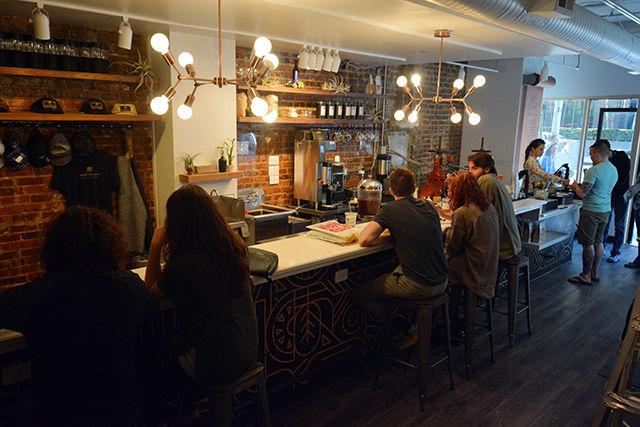Raleigh Raw is one of downtown Raleigh’s newest additions, featuring a menu of raw foods and juices. Nestled in a trendy storefront on Hargett Street, it embraces an industrial feel, complemented by bright, local artwork, bar seating and a hip-hop playlist. Raleigh Raw already has the atmosphere of a well-established, popular hub, where new customers feel like regulars and hosting comes naturally to the owners.
This environment, however, did not come without its fair share of complications. Three years ago, Raleigh Raw was only an idea.
Sherif Fouad, the founder of Raleigh Raw, was exposed to the advantages of raw foods when his father’s cancer diagnosis called for a diet change. Fouad began preparing cold-pressed juices and raw foods for his father, who noticed a vast improvement in his health.
“It’s been really exciting to see the benefits of raw foods firsthand,” Fouad said. “We felt it was important for us to bring that to more people.”
Fouad moved to Raleigh in 2013, when he began working as a bartender. He and his girlfriend, NC State alumna Leslie Woods, began pressing and processing juices from home, which wasn’t a pragmatic operation.
They later received permission to use the bar’s kitchen after closing. Typically, they would work nights at the bar and then press, bottle and deliver juice from 2 a.m. until after 6 a.m.
For two and a half years they continued like this — saving money by taking funds out of their accounts intended for rent and food.
They sold their product through coffee shops until a mishap with the FDA moved them to an online platform.
“We had just ordered a pallet of 3,000 bottles; it was our first major order,” Woods said. “As it arrived, and we’re breaking down the pallet and taking the sleeves of bottles one by one to Sherif’s balcony across the road, we get a call from one of the managers at the coffee shop. He goes, ‘Guys, the FDA is here, they have their badges out, they’ve placed an embargo on your product.’”
Essentially, the product couldn’t be sold through more than one retailer for liability complications. Under this pressure, Fouad and Woods developed a commerce-friendly website for local customers in just five days. Truly a mark of the times, they relied on social media as their sole form of marketing throughout their company’s existence.
“Just being [an online] juice company, we were only able to express our brand through that Instagram platform. People weren’t able to meet us in person, we couldn’t talk one-on-one about a product, it was just them getting online and seeing who we were,” Woods said.
In fall of 2014, the duo purchased their first commercial juicer. Soon after, they began distributing and stocking raw juice vending machines. The next step? Finding the perfect location in downtown Raleigh for a complete cafe.
Their search yielded a historical storefront in need of renovation. Unforeseen complications arose during the restoration process, leading to unexpected costs. Woods and Fouad turned to their customers for support, setting up a Kickstarter campaign with an impressive goal: $37,000 in three weeks. Contributions immediately rolled in from friends, friends of friends and strangers, surpassing the initial amount. Three months later, Raleigh Raw held its grand opening.
In addition to cold-pressed juices, the cafe also serves healthy meals for a fast-paced life. The star of the menu is the selection of poké wraps, which are deconstructed sushi rolls. They also serve “crack coffee,” coffee blended with grass-fed butter and coconut oil and Kombucha, a sweet, fermented tea, among other raw drinks.
“We’ve always been more about the experience,” Woods said. “We are not just a juice company, we are a lifestyle brand — we’re selling a lifestyle, not a product.”
Raleigh Raw continues to look forward. Optimally, according to Woods, the cafe will expand to more locations in North Carolina. They hope to develop shelf-stable products for commercial sale. Beyond company-specific goals, Woods wants to share her experiences with others.
“I’d like to go further into the mentoring, speaking and motivating,” Woods said. “Particularly for young women, [to help] get over the fear of going out on their own and doing something different from the norm, doing something that makes your heart sing — and doesn’t necessarily make your parents proud right off the bat.”
Woods said the struggles in the journey to establishing the cafe helped fuel their imagination.
“Failure allows you to be creative,” Woods said. “It leads you down paths you wouldn’t have chosen conventionally, but it always seems to work out for the better.”













